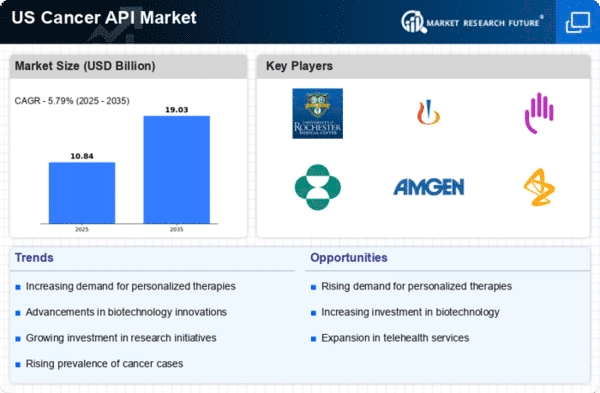Rising Cancer Incidence
The increasing incidence of cancer in the US is a primary driver for the cancer api market. According to the American Cancer Society, approximately 1.9 million new cancer cases are expected to be diagnosed in 2025. This alarming trend necessitates the development of innovative therapies and treatments, thereby propelling the demand for cancer APIs. As healthcare providers seek to address this growing burden, the cancer api market is likely to experience substantial growth. The need for effective cancer treatments is further underscored by the fact that cancer remains the second leading cause of death in the US, accounting for nearly 1 in 4 deaths. Consequently, the cancer api market is positioned to expand as pharmaceutical companies invest in research and development to create targeted therapies.
Regulatory Framework Enhancements
Enhancements in the regulatory framework surrounding drug approvals are playing a pivotal role in shaping the cancer api market. The FDA has implemented several initiatives aimed at expediting the approval process for cancer therapies, including the Breakthrough Therapy Designation and Accelerated Approval pathways. These regulatory advancements are designed to facilitate faster access to innovative treatments for patients with unmet medical needs. As a result, the cancer api market is likely to experience increased activity as companies seek to bring their products to market more swiftly. The supportive regulatory environment encourages investment in cancer research and development, which is essential for the growth of the cancer api market. Furthermore, the collaboration between regulatory agencies and industry stakeholders is fostering a more efficient approval process, ultimately benefiting patients.
Growing Demand for Targeted Therapies
The growing demand for targeted therapies is significantly influencing the cancer api market. Patients and healthcare providers are increasingly favoring treatments that specifically target cancer cells while minimizing damage to healthy tissues. This shift towards precision medicine is reflected in the rising number of targeted therapies approved by the FDA, which has seen a steady increase over the past few years. In 2025, it is projected that targeted therapies will account for over 50% of the total oncology market in the US. This trend is likely to drive the cancer api market as pharmaceutical companies focus on developing APIs that cater to these advanced therapies. The emphasis on personalized treatment regimens is expected to further enhance the demand for specialized APIs, thereby contributing to the overall growth of the cancer api market.
Investment in Research and Development
Investment in research and development (R&D) is a crucial driver for the cancer api market. Pharmaceutical companies are increasingly allocating substantial resources to discover and develop new cancer therapies. In 2025, it is estimated that R&D spending in the oncology sector will exceed $50 billion in the US. This investment is aimed at enhancing the efficacy of cancer treatments and improving patient outcomes. As a result, the cancer api market is likely to benefit from the influx of innovative compounds and formulations. Furthermore, collaborations between biotech firms and academic institutions are fostering a conducive environment for breakthroughs in cancer treatment, thereby stimulating the growth of the cancer api market. The focus on precision medicine and targeted therapies is expected to further drive R&D efforts, leading to a more robust pipeline of cancer APIs.
Increased Awareness and Screening Programs
Increased awareness of cancer and the importance of early detection is driving the cancer api market. Public health campaigns and educational initiatives have led to a rise in cancer screening rates across the US. As more individuals undergo screenings, the likelihood of early cancer detection increases, which in turn drives the demand for effective treatment options. In 2025, it is estimated that screening rates for certain cancers will rise by 20%, leading to a greater need for APIs used in treatment regimens. This heightened awareness not only encourages patients to seek medical advice but also stimulates healthcare providers to adopt new therapies. Consequently, the cancer api market is expected to benefit from this trend as the demand for innovative cancer treatments continues to grow.

















Leave a Comment